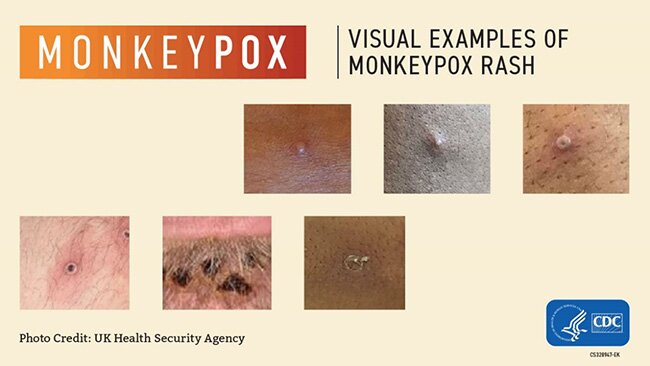Monkeypox is now a public health emergency. Here is what Coloradans need to know.

DENVER — The White House declared monkeypox a public health emergency August 4, freeing up resources for a federal response to the virus, which has led to the infection of nearly 7,000 Americans, though that is likely an undercount.
The United States has the most reported cases of the virus. Colorado has recorded 79 cases, as of August 4. Worldwide, there have been more than 26,000 confirmed cases of monkeypox.
According to the CDC, “monkeypox was discovered in 1958 when two outbreaks of a pox-like disease occurred in colonies of monkeys kept for research.” The first human case of the disease caused by the virus was recorded in 1970.
Historically, monkeypox has been recorded in parts of central and western Africa. Cases outside of those areas were usually “linked to international travel to countries where the disease commonly occurs or through imported animals,” according to the CDC.
With the 2022 outbreak however, the main driver of monkeypox’s spread has been sexual contact, primarily in the gay and queer community.
CDPHE said it has reached out to “LGBTQ+ nonprofits, business leaders, and community organizations to get direct, non-stigmatizing messaging to Coloradans currently most at risk.”
The Center on Colfax, a Denver-based nonprofit community center serving the LGBTQ+ community, has compiled a list of resources about monkeypox.
The Center on Colfax is monitoring the news about monkeypox. We are working closely with & taking guidance from the Colorado Department of Public Health & Environment & will continue to rely on them for updates and direction. Visit https://t.co/p78YZ6KOdP for more information. pic.twitter.com/wL02SHNzFq
— The Center On Colfax + Denver Pride 🏳️🌈 (@CenterOnColfax) August 4, 2022
While it is technically possible for the virus to spread in ways other than sexual contact — face-to-face interactions or by touching a contaminated surface, for example — public health experts say that is incredibly rare.
To date, no Americans have died from monkeypox, but the symptoms can be painful. The most common symptom is a rash that resembles pimples or blisters that can be itchy and painful. Patients can also experience chills, exhaustion and respiratory symptoms. More information on signs and symptoms of monkeypox is available here. People experiencing signs of monkeypox are encouraged to call their health care provider to schedule a test.

The good news is that vaccines are already available, albeit in very limited supply. Locally, the Colorado Department of Public Health and Environment has partnered with 30 health care providers across the state to administer the monkeypox vaccine. As more federal resources become available, Colorado is aiming for broader distribution of vaccines.
“We’re ready for the additional vaccines and are standing up even more vaccine clinics across the state with the help of our local partners,” said Scott Bookman, the division director for CDPHE's Disease Control and Public Health Response. “Even though this is a very different disease than COVID-19 and it spreads differently, we have leveraged all of the lessons we learned from the pandemic to stand up an efficient response.”
If you are interested in receiving the monkeypox vaccine in Colorado, fill out this form. CDPHE will contact eligible recipients to schedule an appointment. Currently, in Colorado, the vaccine is available for “gay, bisexual, and other men who have sex with men who have had sex with multiple people and/or with people they did not previously know in the last 14 days.”
To date, Colorado has received nearly 10,000 doses of the vaccine from the federal government. On August 1, the state requested an additional 5,080 doses.
“We administer or distribute the extremely limited supply of vaccines that the federal government provides us as soon as we receive them,” Governor Jared Polis said. “We will continue to advocate for more vaccines and are pleased to hear more are on the way.”
Talk of public health emergencies, testing and vaccines may bring to mind the COVID-19 pandemic, but experts say it is unlikely that monkeypox will reach COVID-19’s level of spread. However, it won’t just vanish overnight.
“This is not going to blow up like COVID, but this outbreak is going to have legs,” Andrew Noymer, an associate professor at the University of California-Irvine, told Kaiser Health News. “It may be like syphilis and it’ll just sort of be around.”
For more information, visit CDPHE’s monkeypox webpage.
Kyle Cooke is the digital media manager at Rocky Mountain PBS. You can reach him at kylecooke@rmpbs.org.